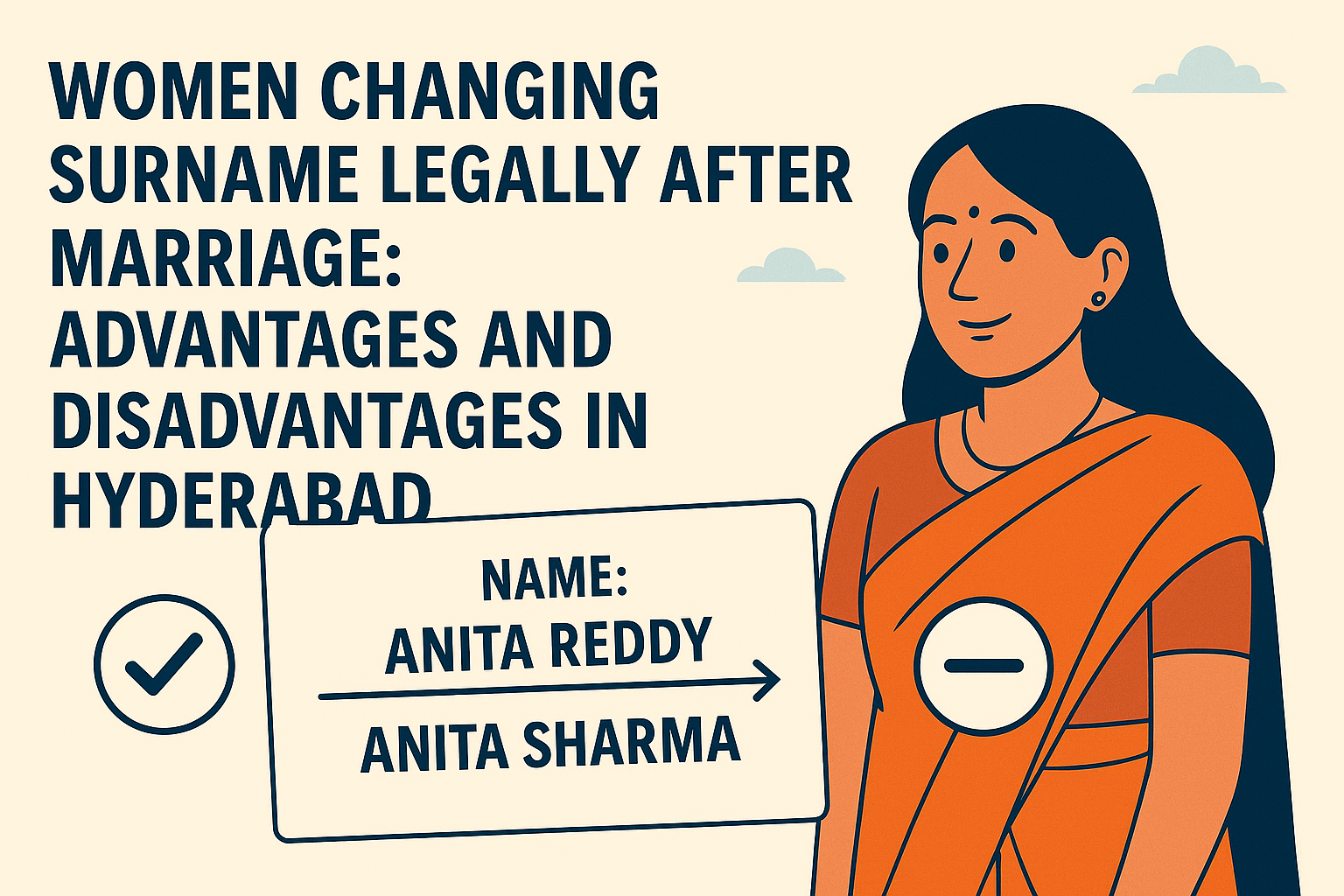
03 Jun Women Changing Surname Legally After Marriage: Advantages and Disadvantages in Hyderabad
Women Changing Surname Legally After Marriage: Advantages and Disadvantages


Women Changing Surname Legally After Marriage: Advantages and Disadvantages in Hyderabad
In most parts of the world, including India, changing surnames after marriage is a commonly followed practice. In Hyderabad, where social and cultural practices are crucial, women typically adopt their husband's surname after marriage. The choice to officially change one’s name is not always simple. It has both benefits and drawbacks. Hence, it is essential to grasp the whole effect of this shift.
Legally changing one's surname following marriage in Hyderabad will be discussed in this article along with the advantages and disadvantages with special attention given to document updating and the legal processes involved.
Advantages of Changing Surname After Marriage
When a woman adopts her husband's surname after marriage, it brings uniformity across all legal documents such as:
- Passports
- Aadhaar
- PAN
- Bank records
- Voting ID
This consistency is especially important since any inconsistencies between a married name and a maiden name could complicate official and legal procedures. Some of these could become inconvenient without uniform name use, such as applying for loans, filing taxes, and handling legal issues.
Cultural and Social Alignment
Changing Surname After Marriage is a strongly ingrained custom in many Indian cultures, especially in Hyderabad. Changing her last name helps the woman fit these social norms, therefore aiding her acceptance into the new family unit. It also indicates a symbolic union with the husband, which emphasizes family ties and common identity.
Simplification in Family Identification
Changing Surname After Marriage usually helps to streamline family identification in government, social, and legal settings. For instance, in handling school records, medical histories, or inheritance claims, matching surnames between couples can simplify legal processes and help to confirm identification. This can be particularly useful when registering children’s names or when claiming rights over shared family property.
Disadvantages of Changing Surname After Marriage
Complications in Identity Proofs
One of the main issues that arise from changing a surname after marriage is the discrepancy between the maiden name and the married name in identity proof documents. This can lead to complications when:
- Traveling abroad (e.g., visa applications).
- Transferring property or assets.
- Handling legal matters that require proof of identity.
This inconsistency might cause uncertainty, particularly if a woman's educational credentials or other records still bear her maiden name but more recent papers show her married name.
Challenges in Educational Records
In Hyderabad, altering educational certificates such as CBSE, university degrees, and school certificates after a name change can be complicated.
Records are not generally changed by universities and education boards. The differences between your official papers (such as PAN or Aadhaar) and school certificates might create legal problems when seeking employment or further studies
Increased Bureaucratic Steps
Changing a surname across all documents requires a lot of paperwork and multiple steps in the bureaucracy:
- Affidavits and name-change notices
- Submission to several organizations, including Passport Seva Kendra, Aadhaar offices, and Registrar of Births and Deaths.
This procedure is time-consuming, entailing administrative delays and usually bringing about extra expenses.
Impact on Inheritance and Property Claims
Legal consequences for inheritance might result from a woman changing her name if family assets or the will have been recorded under her maiden name. This might lead to arguments over asset distribution, particularly if no documentary proof of the woman's marriage or surname change exists.
Importance of Updating Name Across All Documents After Marriage
Updating Name in Important Documents
After marriage, you should change your surname name on every major document, including your passport, Aadhaar, PAN card, bank accounts, etc. Claiming property, insurance benefits, or managing financial assets could cause problems if you do not change your name on all records.
Problems with partial updates: They include the potential for identity verification for investments, tax filings, or perhaps property transactions to cause misunderstanding if just some papers are changed.
The Process of Changing Surname After Marriage in Key Documents
To legally change your surname, follow these general steps:
- Marriage Certificate:
The main document needed to start the surname change is this one.
- ID Proof:
Submit papers such Aadhaar, PAN, passport, and driving license to prove your identity.
- Affidavit:
A notarized affidavit explaining the reason for the change done on Rs. 10/ Non-Judicial Stamp Paper.
Following the right legal process guarantees that the changes are legitimate and may be used to update files free of legal problems.
Challenges in Matriculation Documents
When changing the surname in educational records, there may be hurdles:
- Unless there is a compelling legal justification, colleges or schools could be reluctant to change names.
- This could create problems when you have to present documents for higher education, employment, or career advancement.
Legal advice from experts is recommended for handling discrepancies between school certificates and updated government documents.
Impact on Inheritance
Inheritance problems result from discrepancies between the officially registered name change and the legal documents, such as a will or property deeds. Conflicts over asset distribution could arise if these records show a woman's maiden name conflicts
Added ID Proof: In these situations, legal heirs may have to offer more paperwork, such as marriage certificates and affidavits to prove the connection and explain the name change.
Updating Name in Visa and Travel Documents
For international travel, a change of your surname in passport and visa records is an important first step. Particularly when seeking for spousal visas or traveling abroad, contradictions between the woman's marriage certificate and passport could cause delays.
Alignment Between Marriage Certificate and Passport: To prevent problems, it is vital to make sure the names match in all travel-related papers.
Changing Name in Financial Assets
A surname update is a must on your insurance policies, bank accounts, and mutual funds, among other financial assets. The Aadhaar or PAN card name change procedure helps to simplify financial record alignment with your new name.
Failure to update financial assets may result in issues when claiming insurance or transferring funds.
Challenges if a Woman Does Not Change Her Surname After Marriage
Not updating the surname after marriage can create difficulties in multiple areas:
- Tax filings:
Discrepancies in names can cause issues when filing tax returns.
- Insurance claims:
Difficulty in claiming benefits if the surname is inconsistent across documents.
- Property Transactions:
Problems could develop when the names on important documents do not correspond while buying or selling real estate.
Confirming marital status requires preparation of the marriage certificate and supporting papers.
Different Surnames in Child’s Birth Certificate
In some cases the lady may decide against changing her name after marriage, which would result in varied surnames for the mother and kid. However, this is typically not an issue for:
- Passport applications
- School admissions
If the names of the parents vary, it is crucial to guarantee uniformity in the child's legal papers.
Adding Husband’s Surname
Adding the husband’s surname to the wife’s existing name can be a simple way to create uniformity in legal records without fully replacing the maiden name.
This can help simplify identification across official documents while respecting cultural norms.
Full Name Change After Marriage
Some women in certain communities choose to change both their first name and surname after marriage. This requires:
- Legal procedures: A more complex process to update official records and documents.
- Challenges: The process can involve additional paperwork and more time to update personal records across various authorities.
Changing a last name after marriage is legally significant as well as culturally relevant. Although legal consistency and social alignment are obvious benefits, there are also disadvantages, including the complexities in identity proof and the bureaucratic hassles of updating all the vital documents.
To avoid legal, financial, and personal issues, women should make sure their name change shows up on all important papers following marriage. Early appropriate action will help to avoid problems related to inheritance, property transactions, and travel.
Always seek legal advice and adhere to the recommended processes to guarantee your surname change is handled properly and smoothly.

